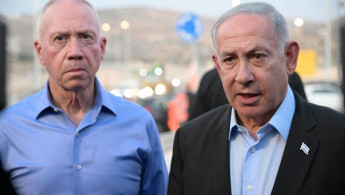UK legal groups submit ICC brief backing court to issue Netanyahu, Gallant arrest warrants
Two London-based legal groups have submitted an amicus curiae ('friend of the court') brief to the International Criminal Court (ICC) asserting that there were no legal obstructions to the issuance of arrest warrants against Israeli leaders over alleged war crimes and crimes against humanity.
The filing, announced by the International Centre of Justice for Palestinians (ICJP) and the Centre for Human Rights Law (CHRL) at SOAS University of London on Thursday, comes as the court decides whether to approve ICC chief prosecutor Karim Khan's application in May for arrest warrants against Israeli Prime Minister Benjamin Netanyahu and Defence Minister Yoav Gallant.
In late July, the ICC announced it had received 70 amicus curiae applications regarding the possible arrest warrants, some in favour of Israel and some in favour of the warrants being issued.
Among the states, entities and individuals who challenged the court's jurisdiction were the United States, Germany, Argentina, the Israeli Bar Association and Republican US Senator Lindsey Graham.
The high volume of applications is seen as having delayed the court's decision.
The United Kingdom considered submitting a brief challenging the court's jurisdiction, however, the recently-elected Labour government of Prime Minister Kier Starmer dropped the objection.
The ICJP-IHRL submission asserts the court's authority over the matter, saying that "jurisdiction in the 'Situation in the State of Palestine' is settled and clear, and that the matter of jurisdiction of Israeli nationals constitutes a non-issue and is not a barrier to the full exercise of the Court’s jurisdiction".
The brief states that despite Israel not being a member of the court, the ICC does have jurisdiction over Israeli nationals, citing the court's previous decision to issue warrants against citizens of Russia - a non-member - over crimes allegedly committed in Crimea and Ukraine.
The brief also addresses concerns about the continued applicability of the provisions of the Oslo Accords and highlights the principle of 'complementarity', where the court may exercise its jurisdiction when a national legal system has failed to do so.
Israel rarely prosecutes its own soldiers for alleged abuses committed against Palestinians, with Israeli rights group Yesh Din noting that from 2017 to 2021, just 0.87 percent of complaints against soldiers led to prosecutions, according to the Israeli rights group Yesh Din.
In its war on Gaza since 7 October, Israel has been accused by rights groups of several war crimes, including starving Gaza's population, intentionally harming civilians, killing journalists and the use of torture and sexual abuse on Palestinian detainees.
ICC prosecutor Khan's application against the two Israeli leaders is for the war crimes of using starvation as a weapon of war and wilful killing, among other charges.
Khan also applied for a warrant against Hamas leader Yahya Sinwar, assassinated Hamas political leader Ismail Haniyeh and Hamas armed wing commander Mohammed al-Deif, who Israel claims to have killed in July.





 Follow the Middle East's top stories in English at The New Arab on Google News
Follow the Middle East's top stories in English at The New Arab on Google News
![The UAE is widely suspected of arming the RSF militia [Getty]](/sites/default/files/styles/image_330x185/public/2024-11/GettyImages-472529908.jpg?h=69f2b9d0&itok=Yauw3YTG)
![Netanyahu furiously denounced the ICC [Getty]](/sites/default/files/styles/image_330x185/public/2024-11/GettyImages-2169352575.jpg?h=199d8c1f&itok=-vRiruf5)
![Both Hamas and the Palestinian Authority welcomed the ICC arrest warrants [Getty]](/sites/default/files/styles/image_330x185/public/2024-11/GettyImages-2178351173.jpg?h=199d8c1f&itok=TV858iVg)